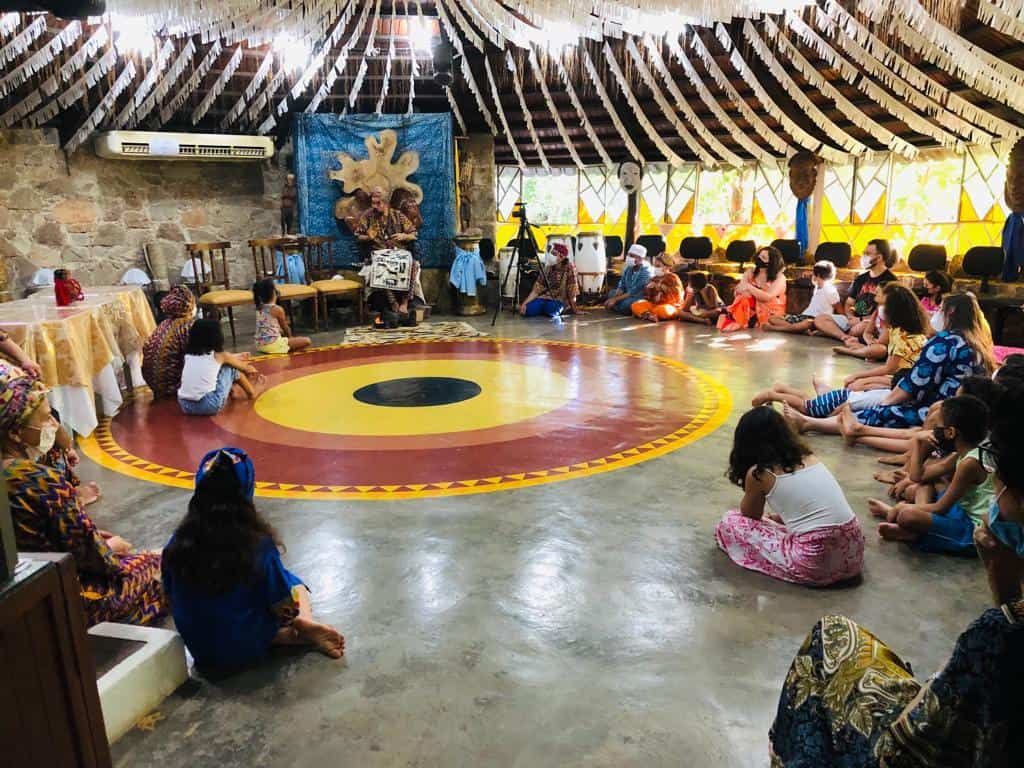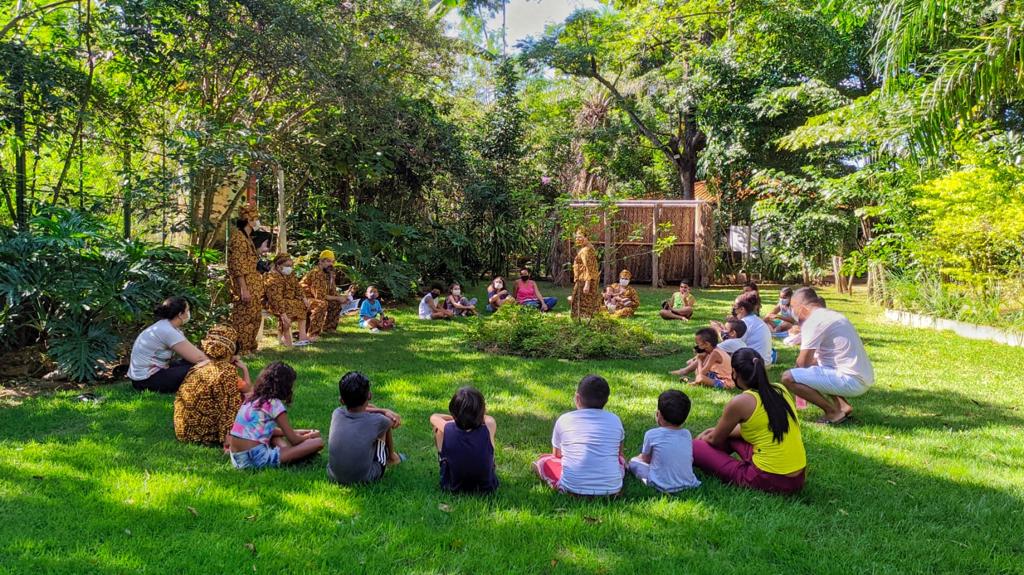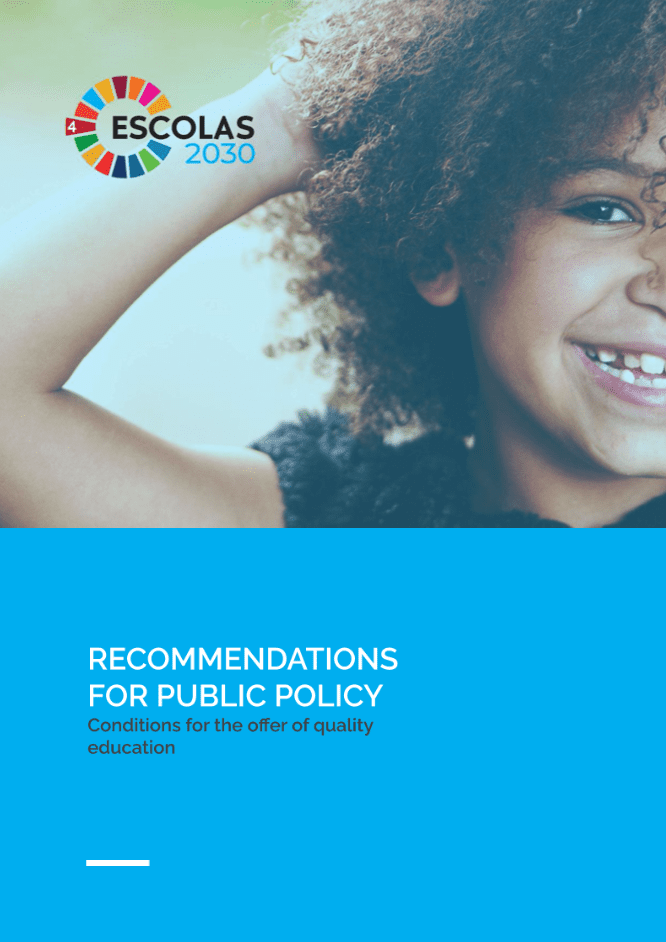Public policy must support education professionals to succeed in their roles – but how can they do this is the important question. Some of the professionals themselves have offered answers that are set out in this document as recommendations for policies focused on the conditions needed to provide quality and inclusive education.
The recommendations were created by the Schools2030 programme in Brazil from across both school and non-school educational organisations. Schools2030 is a ten-year (2020 to 2030) global participatory learning improvement programme that uses human-centred design, and in Brazil, action-research to offer improvements to holistic quality learning outcomes. The initiative proposes to involve, as “innovation laboratories,” one thousand educational organisations from four continents (one hundred in each country). Afghanistan, India, Pakistan, Portugal, Kenya, Kyrgyzstan, Tajikistan, Uganda, and Tanzania are also participating. The Brazilian actions are coordinated by specialists from the School of Education at University of São Paulo (USP) and the civil society organisation, Ashoka, supported with funds from the Itaú Foundation for Education and Culture.
The intent is to ensure the UN’s Sustainable Development Goal 4: inclusive, equitable, and quality education, promoting lifelong learning opportunities for all.
In Brazil, the programme seeks to create new parameters for assessing learning based on the practice of holistic and changemaker education. Most of the organisations are public schools in vulnerable territories in the five regions of the country. The results of its three years of operation have generated the Recommendations for public policies: Conditions for the Offer of Quality Education – a document that includes guiding principles and concrete examples.
The ideas serve as input for a broad debate with civil society and public authorities on education. The debate is very much permeated by questions about the efficiency of educational systems.
One of the proposals is that the Ministry and the Secretaries of Education, responsible for providing the different levels of Brazil’s basic education system, should promote specialised technical, financial, and institutional support (particularly working hours for professionals) so that research projects can be developed and carried out by schools on their own practices. In this way, the people who take part in them will have better conditions to reflect on what they do, collectively producing knowledge that can be used as a basis for educational activities and evaluation processes.
There are examples like that of the state school system in Bahia, in which educators spend one third of their teaching hours in activities outside the classroom, which are also necessary to dedicate to research on their educational practice. The actions of the Secretary of Education of Belo Horizonte go further: an Education Week with 75,000 participants, creation of a web portal, encouragement of exchanges between professionals from their schools in dialog with renowned scholars in the field, conferences organisation, and a digital publication on good practices during the COVID-19 pandemic.
Another recommendation in the document is that Secretaries of Education, responsible for providing the different levels of Brazil’s basic education system, map out, support, and disseminate in their network assessment procedures and instruments developed by the schools that include the necessary learning for the full development of a person, such as empathy, collaboration, self-knowledge, creativity, and leadership – necessary facets of the holistic education that is desired. Along with the dissemination of these procedures and instruments, there must be continuous training processes for their qualified implementation.

The learnings related to the various dimensions of the human being are not included in the governmental systems of evaluation, although the Brazilian Constitution establishes as the goals of education: the full development of the person, their preparation for the exercise of citizenship and their qualification for work. These goals cannot be achieved merely by the current offering of full-time schools.
Moreover, the people who directly carry out the educational practices (educators) are also subjects of their evaluation, even though this is a decisive factor in the quality of education. One experience that strives in this direction is that of the Alan Pinho Tabosa State School in Pentecoste City, State of Ceará, whose “Individual Academic and Cooperative Performance Index” was created to assess each student’s level of cooperation, stimulate interdependence, empathy, and enhance class participation for learning.
What is proposed goes in the direction of giving voice to those who are in the daily educational practices, so that they can guide the process and influence the policies, pointing out what leads to good results. It is a warning about the importance of the public power to make practices visible and make them available for use in different places.
Note that the recommendations show great amplitude, encompassing the participation of students and their leadership, not reducing their focus to the unilateral action of professionals, and opening possibilities to foster a democratic culture.
The document emanates from the experience of educational organisations engaged in action-research efforts, a strand of research that is both rigorous and mobilising, essentially carried out by groups dedicated to “doing by researching” and “researching by doing”, along the lines of an intervention for the improvement of what they prioritise. In the case of schools and other educational organisations, research constitutes the educational work itself. Teachers usually do this individually, acting and thinking about what goes well and what presents difficulties. But they face many obstacles in making this research a collective activity.
Removing these hindrances is a condition for locally formulated educational solutions that can inform systemic changes to improve learning outcomes. Beyond Brazil, global education ecosystems need this inspiration to produce new and feasible knowledge about what enables children and youth to achieve key development and learning outcomes.
The path to be followed, therefore, is to boost processes in which teachers, managers, and students are heard by the government and international organisations, leading to their growing knowledge about effective practices for the promotion of quality education.
Placed as radiating centers rather than targets of social change, educational institutions will have agency in educational reforms, which can rely on evidence from research aimed at their own improvement. They will replace the dominance of a deficit narrative with the identification of aspects of effectiveness and advancement.

